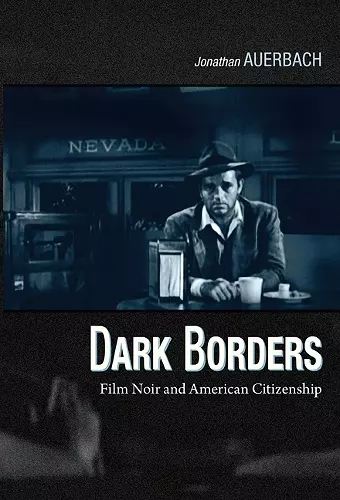Dark Borders
Film Noir and American Citizenship
Format:Paperback
Publisher:Duke University Press
Published:25th Mar '11
Currently unavailable, and unfortunately no date known when it will be back

Shows how politics and aesthetics merge in American film noirs made between the late 1930s and the mid-1950s; their oft-noted uncanniness betrays the fear that un-American foes lurk within the homeland.Dark Borders connects anxieties about citizenship and national belonging in midcentury America to the sense of alienation conveyed by American film noir. Jonathan Auerbach provides in-depth interpretations of more than a dozen of these dark crime thrillers, considering them in relation to U.S. national security measures enacted from the mid-1930s to the mid-1950s. The growth of a domestic intelligence-gathering apparatus before, during, and after the Second World War raised unsettling questions about who was American and who was not, and how to tell the difference. Auerbach shows how politics and aesthetics merge in these noirs, whose oft-noted uncanniness betrays the fear that “un-American” foes lurk within the homeland. This tone of dispossession was reflected in well-known films, including Double Indemnity, Out of the Past, and Pickup on South Street, and less familiar noirs such as Stranger on the Third Floor, The Chase, and Ride the Pink Horse. Whether tracing the consequences of the Gestapo in America, or the uncertain borderlines that separate the United States from Cuba and Mexico, these movies blur boundaries; inside and outside become confused as (presumed) foreigners take over domestic space. To feel like a stranger in your own home: this is the peculiar affective condition of citizenship intensified by wartime and Cold War security measures, as well as a primary mood driving many midcentury noir films.
“This terrific book offers fresh insight into both the genre of film noir and the cultural production of the postwar and early Cold War period. Through rich, historically contextualized readings of a range of noir films, Jonathan Auerbach shows how the genre captured the uncanniness of a time of suspicion and paranoia. By illuminating the uncanny figures (the immigrants, the aliens, the strangers) and spaces (national borders and urban zones) that characterize the noir affect, he shows how these films dramatized the national response to the changing terms of citizenship and subjectivity as the anxious fear of the stranger within.”—Priscilla Wald, author of Contagious: Cultures, Carriers, and the Outbreak Narrative
“While scholars have long attended to film noir as one of the preeminent genres of U.S. cinema, they ironically have rarely studied it in terms of its specific engagements with national self-identity and self-definition. Deftly employing his strong and reputed background in American studies to far-reaching ends, Jonathan Auerbach shows precisely how film noir was central to the country’s self-questioning in the fraught times of the Cold War. This is a groundbreaking study that comes up with trenchant insights about a genre that one might have thought had nothing new to yield to critical inquiry.”—Dana Polan, author of Julia Child’s The French Chef
“Auerbach evokes the ever-present sense of fear existing in an early Cold War American public through his analysis of these films. Both insightful and unique in its undertaking, this book speaks openly and convincingly to the relationship between political agenda, disenfranchisement and art.” -- Laura Crawford * Media International Australia *
“This insightful study wisely ranges beyond the genre’s usual suspects. Recommended. All readers.” -- M. Yacowar * Choice *
“Auerbach provides unique close readings of a select group of films that assist us in seeing film noir in relation to concerns over citizenship and Cold War paranoia. It provides a valuable starting point from which we can hope future scholarship will further delve into such connections.” -- Christopher Robé * Journal of American History *
“[A] wholly original, ground-level reconsideration of noir's cultural setting. . . . Auerbach's book augurs . . .a theory-to-come of U.S. film that can leam to disable those old tropes and inspire truly fresh lines of aesthetic and political questioning.” -- Matt Tierney * Film Criticism *
“[I]f you have an abiding interest in film noir . . . you will find Dark Borders has a lot to offer. While most books on film noir take a rather broad approach in their examination of the genre, Auerbach chose a core of films to study in order to link the book’s overriding theme. By concentrating on a handful of films, he provides a comprehensive insight to each one, and therein lies the strength of the book.” -- Phil Stufflebean * American Film Noir *
“]Auerbach’s] rigorous and creative readings of these films will prove indispensable for serious students of noir. . . . some of the most exciting moments to be noted in Auerbach’s compelling book demonstrate nuanced uses of cultural history to inform his film analysis. Such exciting subjects include Lucky Luciano and the Second World War, Hemingway’s annoyance over inefficient government help during the 1935 hurricane, and the emergence of corporate and managerial structures of power and identity.” -- Sam B. Girgus * American Literature *
“Auerbach offers some significant fresh insights into territory one would have thought to now be fully excavated.“ -- Tony Williams * Screening the Past *
“The book as a whole is exemplary in its analysis of the interrelation between film noir and the social and political history of the 1940s and early 50s.” -- Martin Fradley * Film Quarterly *
ISBN: 9780822350064
Dimensions: unknown
Weight: 399g
280 pages